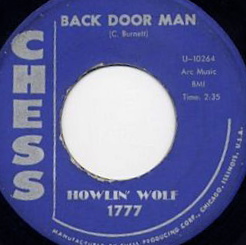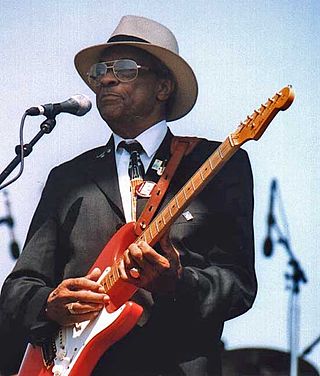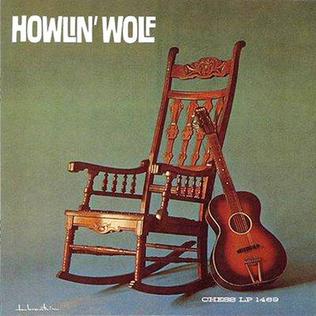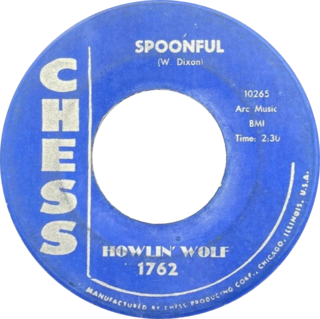
Chester Arthur Burnett, better known by his stage name Howlin' Wolf, was an American blues singer and guitarist. He was at the forefront of transforming acoustic Delta blues into electric Chicago blues, and over a four-decade career, recorded blues, rhythm and blues, rock and roll, and psychedelic rock. He is regarded as one of the most influential blues musicians of all time.

"Misty Mountain Hop" is a song by English rock band Led Zeppelin that was released in 1971 by Atlantic Records. The song appears on the band's untitled fourth album, and was released as the B-side to the single "Black Dog" and performed in most of the band's 1972 and 1973 concert tours. In 2019, Rolling Stone ranked the song number 10 on its list of the 40 greatest Led Zeppelin songs.

"Black Dog" is a song by English rock band Led Zeppelin. It is the first track on the band's untitled fourth album (1971), which has become one of the best-selling albums of all time. The song was released as a single and reached the charts in many countries. It is "one of the most instantly recognisable Zeppelin tracks", and was included in Rolling Stone's 500 Greatest Songs of All Time list (US), and ranked No. 1 in Q magazine's (UK) "20 Greatest Guitar Tracks". The lyrics contain typical bluesman themes of lust, eroticism and betrayal.

"You Shook Me" is a 1962 blues song recorded by Chicago blues artist Muddy Waters. Willie Dixon wrote the lyrics and Earl Hooker provided the instrumental backing; the song features Waters' vocal in unison with Hooker's slide-guitar melody. "You Shook Me" became one of Muddy Waters' most successful early-1960s singles and has been interpreted by several blues and rock artists.

"Back Door Man" is a blues song written by American musician Willie Dixon and recorded by Howlin' Wolf in 1960. The lyrics draw on a Southern U.S. cultural term for an extramarital affair. The song is one of several Dixon-Wolf songs that became popular among rock musicians, including the Doors who recorded it for their 1967 self-titled debut album.

Hubert Charles Sumlin was a Chicago blues guitarist and singer, best known for his "wrenched, shattering bursts of notes, sudden cliff-hanger silences and daring rhythmic suspensions" as a member of Howlin' Wolf's band. He was ranked number 43 in Rolling Stone's "100 Greatest Guitarists of All Time".

"Bring It On Home" is a blues song written by American music arranger and songwriter Willie Dixon. Sonny Boy Williamson II recorded it in 1963, but the song was not released until 1966. Led Zeppelin adapted it in part as a homage to Williamson in 1969 and subsequently, the song has been recorded by several artists.
"Sick Again" is a song by English rock band Led Zeppelin from their 1975 album Physical Graffiti. It was written by singer Robert Plant. The song is about a group of teen groupies, which Plant referred to as "L.A. Queens", with whom the band were acquainted on their 1973 US Tour.
"How Many More Times" is the ninth and final track on English rock band Led Zeppelin's 1969 debut album Led Zeppelin. The song is credited in the album liner to Jimmy Page, John Paul Jones, and John Bonham, but Robert Plant was later added to the ASCAP credits.
"Houses of the Holy" is a song by English rock band Led Zeppelin from their 1975 sixth album Physical Graffiti. The name of the song was used as the title of the band's fifth album, although it was not included on that album; they decided the song did not fit well with the other album material, so it was moved to the subsequent release.
"Celebration Day" is a song by English rock band Led Zeppelin, and the third track from their 1970 album Led Zeppelin III. The band's last concert film and album, released on 19 November 2012, took their name from this song.
"Custard Pie" is the opening track on the English rock band Led Zeppelin's sixth album, Physical Graffiti, released in 1975.

Howlin' Wolf is the second album from the Chicago blues singer/guitarist/harmonicist, Howlin' Wolf. It is a collection of twelve singles previously released by the Chess label from 1960 through 1962. Because of the illustration on its sleeve, the album is often called The Rockin' Chair Album, a nickname even added to the cover on some reissue pressings of the LP.

"Spoonful" is a blues song written by Willie Dixon and first recorded in 1960 by Howlin' Wolf. Called "a stark and haunting work", it is one of Dixon's best known and most interpreted songs. Etta James and Harvey Fuqua had a pop and R&B record chart hit with their duet cover of "Spoonful" in 1961, and it was popularized in the late 1960s by the British rock group Cream.

The London Howlin' Wolf Sessions is an album by blues musician Howlin' Wolf released in 1971 on Chess Records, and on Rolling Stones Records in Britain. It was one of the first super session blues albums, setting a blues master among famous musicians from the second generation of rock and roll, in this case Eric Clapton, Steve Winwood, Charlie Watts, and Bill Wyman. It peaked at #79 on the Billboard 200.
"Wang Dang Doodle" is a blues song written by Willie Dixon. Music critic Mike Rowe calls it a party song in an urban style with its massive, rolling, exciting beat. It was first recorded by Howlin' Wolf in 1960 and released by Chess Records in 1961. In 1965, Dixon and Leonard Chess persuaded Koko Taylor to record it for Checker Records, a Chess subsidiary. Taylor's rendition quickly became a hit, reaching number thirteen on the Billboard R&B chart and number 58 on the pop chart. "Wang Dang Doodle" became a blues standard and has been recorded by various artists. Taylor's version was added to the United States National Recording Registry in 2023.

"Little Red Rooster" is a blues standard credited to arranger and songwriter Willie Dixon. The song was first recorded in 1961 by American blues musician Howlin' Wolf in the Chicago blues style. His vocal and slide guitar playing are key elements of the song. It is rooted in the Delta blues tradition and the theme is derived from folklore. Musical antecedents to "Little Red Rooster" appear in earlier songs by blues artists Charlie Patton and Memphis Minnie.

The Howlin' Wolf Album is the first studio album by Howlin' Wolf, released in 1969. It features members of Rotary Connection as his backing band. The album mixed blues with psychedelic rock arrangements of several of Wolf's classic songs. Howlin' Wolf strongly disliked the album, which is noted on the album's cover art. The album peaked at number 69 on Billboard magazine's "Black Albums" chart.

"Good Times Bad Times" is a song by the English rock band Led Zeppelin, featured as the opening track on their 1969 debut album Led Zeppelin. The song was Led Zeppelin's first single released in the US, where it reached the Billboard Hot 100 chart.












